Ecosprin 75
Ecosprin 75 is a blood-thinning/antiplatelet agent that belongs to the anti-inflammatory and blood-thinning/antiplatelet drug class. Its application is dependent on its strength. Ecosprin 75 is a blood-thinning or antiplatelet drug used to prevent heart attacks and strokes at a modest dose (approximately 75 mg). In high doses (about 325 mg), however, it functions as an analgesic, reducing minor aches, pains, and fevers. Ecosprin 75 may also be prescribed right after a heart attack to prevent blood clots and cardiac tissue destruction. A heart attack is a condition in which blood flow is obstructed due to clogged arteries. The build-up of fat, cholesterol, and other substances (plaque) in arteries causes this blockage.
In a low dose, Ecosprin 75 functions as a blood thinner for heart-related blood clot issues, and in a high dose, it acts as an analgesic or pain reliever. Ecosprin 75’s anti-platelet activity aids in the thinning of blood, lowering the risk of blood clot development and subsequent heart attack. Low-dose aspirin reduces the stickiness of the blood, lowering the risk of heart attack and stroke. It also suppresses the activities of cyclooxygenase (COX) and prostaglandins (PGs), which are responsible for inflammation, swelling, pain, and fever.
Ecosprin 75 can be taken with or without food. With a glass of water, it should be consumed completely. It should not be chewed, bit, or broken. Based on your medical condition, your doctor will tell you how often you should take your medications. Ecosprin 75 can be given by mouth, rectal, or intravenous (IV) injection. Stomach discomfort, heartburn, tiredness, moderate headache, ankle swelling (oedema), slow heart rate, and nausea are all possible side effects. Driving should be avoided when taking Ecosprin 75 because it is known to cause dizziness. The majority of these Ecosprin 75 adverse effects do not require medical care and fade away with time. However, if the negative effects do not go away, consult your doctor.
When used with Ecosprin 75, you should avoid drinking alcohol, taking pain relievers (ibuprofen, ketorolac), and taking the abortion pill (mifepristone), as these can raise your risk of stomach or gastrointestinal bleeding. Children with the flu, fever, or chickenpox should not be given Ecosprin 75 unless their doctor has prescribed it. Reye’s syndrome can be caused by Ecosprin 75. (rare but serious condition with swelling in the brain and liver common in children and teenagers). Ecosprin 75 should not be used during the latter trimester of pregnancy due to the risk of harm to the unborn infant. Ecosprin 75 is excreted in breast milk and could affect a nursing baby. If you’re pregnant, planning a pregnancy, or nursing a baby, see your doctor before using Ecosprin 75.
Many people who take Ecosprin 75 don’t have any major negative effects. If you have stomach discomfort, moderate indigestion, easy bruising or bleeding, problems hearing, ringing in the ears, dark urine, a change in the amount of urine, persistent or severe nausea/vomiting, unexplained tiredness, dizziness, or yellowing of the eyes/skin, consult your doctor (jaundice). Ecosprin 75 may raise the risk of gastrointestinal (stomach/intestinal) bleeding, intracranial (brain) bleeding, and other types of bleeding in the body. Ecosprin 75 should only be taken after speaking with a doctor.
Ecosprin 75 is used for pain treatment, heart attack prevention, and stroke prevention.
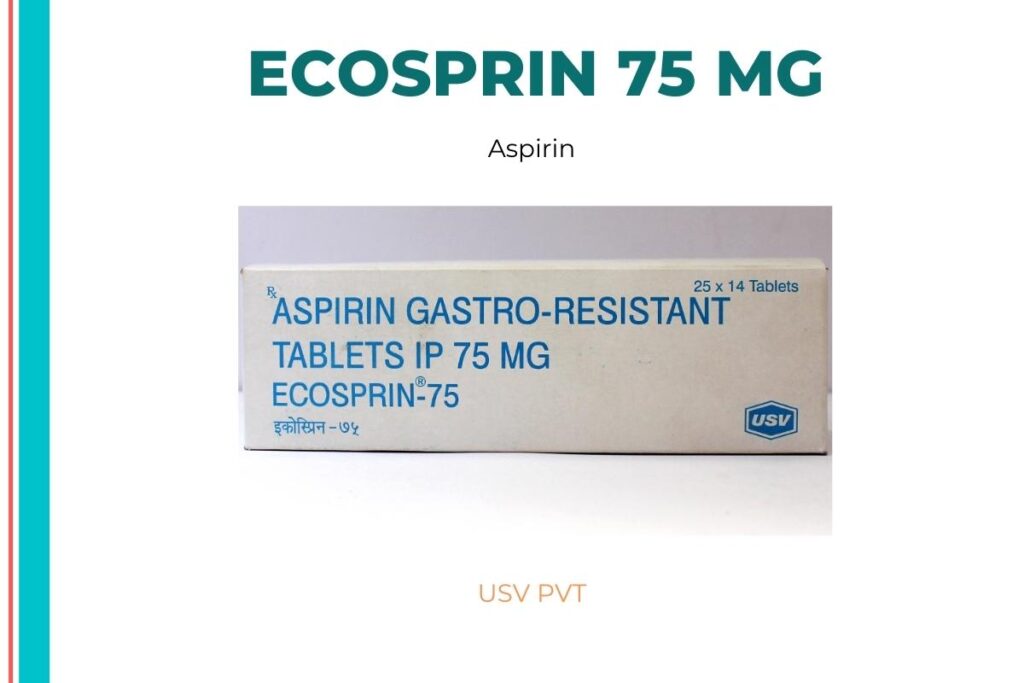
Medicinal Advantages
Ecosprin 75, in a low dose, serves as a blood thinner, preventing blood cells from sticking together and forming a blood clot in the heart’s arteries. This reduces the likelihood of a subsequent heart attack or stroke. The cyclooxygenase (COX) and prostaglandins (PGs) that induce inflammation, swelling, discomfort, and fever are inhibited by a high dose of Ecosprin 75. As a result, it serves as both a blood thinner and an analgesic, reducing pain while also lowering the risk of heart attack or stroke.
Use Instructions
Ecosprin 75 should only be taken if a doctor has recommended it. Always follow your doctor’s instructions when taking Ecosprin 75. To avoid stomach discomfort, use Ecosprin 75 with food. Ecosprin 75 should be taken with a full glass of water. Before ingesting, do not crush or chew.
Store in a cool, dry location away from direct sunlight.
Ecosprin 75 Side Effects
Ecosprin 75, like all drugs, can produce adverse effects, but not everyone experiences them. Stomach trouble, heartburn, easy bruising/bleeding, difficulty hearing, ringing in the ears, change in the amount of urine, persistent or severe nausea/vomiting, unexplained tiredness, dizziness, dark urine, yellowing eyes/skin are some of the frequent adverse effects of Ecosprin 75. (jaundice). Tell your doctor if any of these side effects persist. Your doctor may reduce the dosage or advise you to stop taking this medication.
Drug Recommendations
With Ecosprin 75, you should avoid drinking alcohol, taking pain relievers (such as ibuprofen, naproxen, or ketorolac), and taking the abortion pill (mifepristone). When taken together, the risk of gastrointestinal bleeding increases, and the effectiveness of Ecosprin 75 in preventing heart attack and stroke decreases. Children with the flu, fever, or chickenpox should not be given Ecosprin 75 unless their doctor has prescribed it. Reye’s syndrome can be caused by Ecosprin 75. (rare but serious condition with swelling in the brain and liver common in children). Ecosprin 75 should not be used during the latter trimester of pregnancy due to the risk of harm to the unborn infant. Ecosprin 75 is excreted in breast milk and could affect a nursing baby. If you’re pregnant, planning a pregnancy, or nursing a baby, see your doctor before using Ecosprin 75. Aspirin may raise the risk of gastrointestinal (stomach/intestinal) bleeding, intracranial (brain) bleeding, or bleeding in other parts of the body. Aspirin may interfere with laboratory testing such as urine sugar assays, resulting in inaccurate findings. Make sure lab staff and doctors are aware that you are taking Ecosprin 75. If you have a stomach ulcer, bleeding disorder, low Vitamin K, aspirin-induced asthma, are allergic to Aspirin or other pain relievers, have renal illness, liver disease, diabetes, or are having surgery, tell your doctor before using Ecosprin 75.
Interactions Between Drugs
Interactions between drugs: Aspirin has been observed to interact with a variety of medications. Blood thinners (warfarin, heparin, phenindione, clopidogrel), immune-related drugs (cyclosporin, tacrolimus), high blood pressure pills (captopril, metoprolol), heart disease pills (acetazolamide, digoxin), antidepressants (fluoxetine, sertraline, lithium), pain relievers (ketorolac, naproxen, ibuprofen), steroids, gout drug (probene (oral alendronate).
Drug-Food Interaction: Taking Aspirin with alcohol, caffeine, or herbal supplements like ‘ginkgo biloba’ can impair the medicine’s effectiveness and increase the risk of side effects.
People with a blood clotting disorder (hemophilia), bleeding disorder, von Willebrand’s disease, or telangiectasia, asthma, liver/kidney disease, stomach or intestinal ulcer, or serious heart problems that cause shortness of breath should not use Ecosprin 75.
Safety Suggestions
ALCOHOL
It is not suggested that you drink alcohol while taking Aspirin since the two may exacerbate side effects such as stomach ulcers and gastric hemorrhage.
PREGNANCY
Only take if your doctor has prescribed it.
BREAST FEEDING
Aspirin should only be taken as directed because it is known to pass to the infant in a limited amount via breast milk.
DRIVING
DRIVING WITH Aspirin DOESN’T IMPAIR YOUR ABILITY TO DRIVE.
LIVER
Aspirin should be used with caution if you have a history of liver illness or condition. Your doctor may need to alter your dose.
KIDNEY
Aspirin should be used with caution if you have a history of kidney illness or condition. Your doctor may need to alter your dose.
No habit formation
Advice on Diet and Lifestyle
Aspirin treatment is found to be beneficial when combined with a low-cholesterol diet and frequent exercise.
Alcohol should be avoided because it can increase the risk of gastrointestinal bleeding (stomach bleeding).
High-fat meals should be avoided to reduce the chance of a heart attack; instead, eat heart-healthy foods.
For a rapid recovery, it is recommended that you avoid eating junk food from outside sources, stick to freshly made home cooked meals, and get plenty of rest.
Also, replacing most of your saturated fats with unsaturated fats will lower total and LDL cholesterol in a short period of time.
Avocados, olive oil, fatty salmon, and almonds are high in heart-healthy unsaturated fats, thus eating them on a daily basis is good.
Recommendations
Aspirin has the potential to induce gastrointestinal bleeding. If the bleeding does not stop, see your doctor.
Additional Information : This item is non-refundable.
Concerns of Patients
A heart attack happens when the flow of blood to the heart is obstructed by plaque (fat/cholesterol) deposited in the walls of the arteries that nourish the heart (coronary arteries). Plaque can break and form a blood clot, which can obstruct blood flow. A stroke, on the other hand, is a medical emergency in which the brain’s blood flow is diminished or blocked, preventing brain cells (neurons) from receiving enough oxygen and nutrients. As a result, in a matter of minutes, brain cells begin to die.
FAQs
Aspirin may induce gastrointestinal discomfort. To avoid this, take Aspirin after a meal or follow your doctor’s instructions.
The drug Aspirin is used to thin the blood. It acts by stopping platelets (a kind of blood cell) from adhering to each other and clotting.
In most circumstances, your doctor will advise you to stop taking Aspirin a few days before your surgery to avoid significant blood loss.
Reye’s syndrome is a rare and deadly condition that usually affects children who are administered Aspirin to treat viral infections such as small pox and chicken pox.
Aspirin can induce stomach bleeding, which can be exacerbated if the patient is also taking alcohol. If the bleeding does not stop, see your doctor and follow his or her instructions.
Aspirin may cause an asthma attack or exacerbate your health if you have asthma, hay fever, or any other chronic respiratory disease. If you have asthma, please consult your doctor before using Ecosprin 75.
Aspirin potential to prevent heart attack and stroke as a blood thinner may be reduced if used with ibuprofen on a daily basis.
Aspirin is not recommended for the treatment of stomach pain. If you feel stomach pain, it could be an indication of gastric bleeding or heartburn, which is one of the Aspirin adverse effects.
Taking it with milk or a snack can help reduce stomach distress.
If a child or teenager has the flu, chickenpox, or any other unidentified sickness, they should not take Ecosprin 75. Furthermore, if they have recently received any immunization, taking Aspirin may raise their risk of developing Reye’s syndrome, an uncommon but deadly illness. Your doctor will determine whether or not to prescribe for children and teenagers.

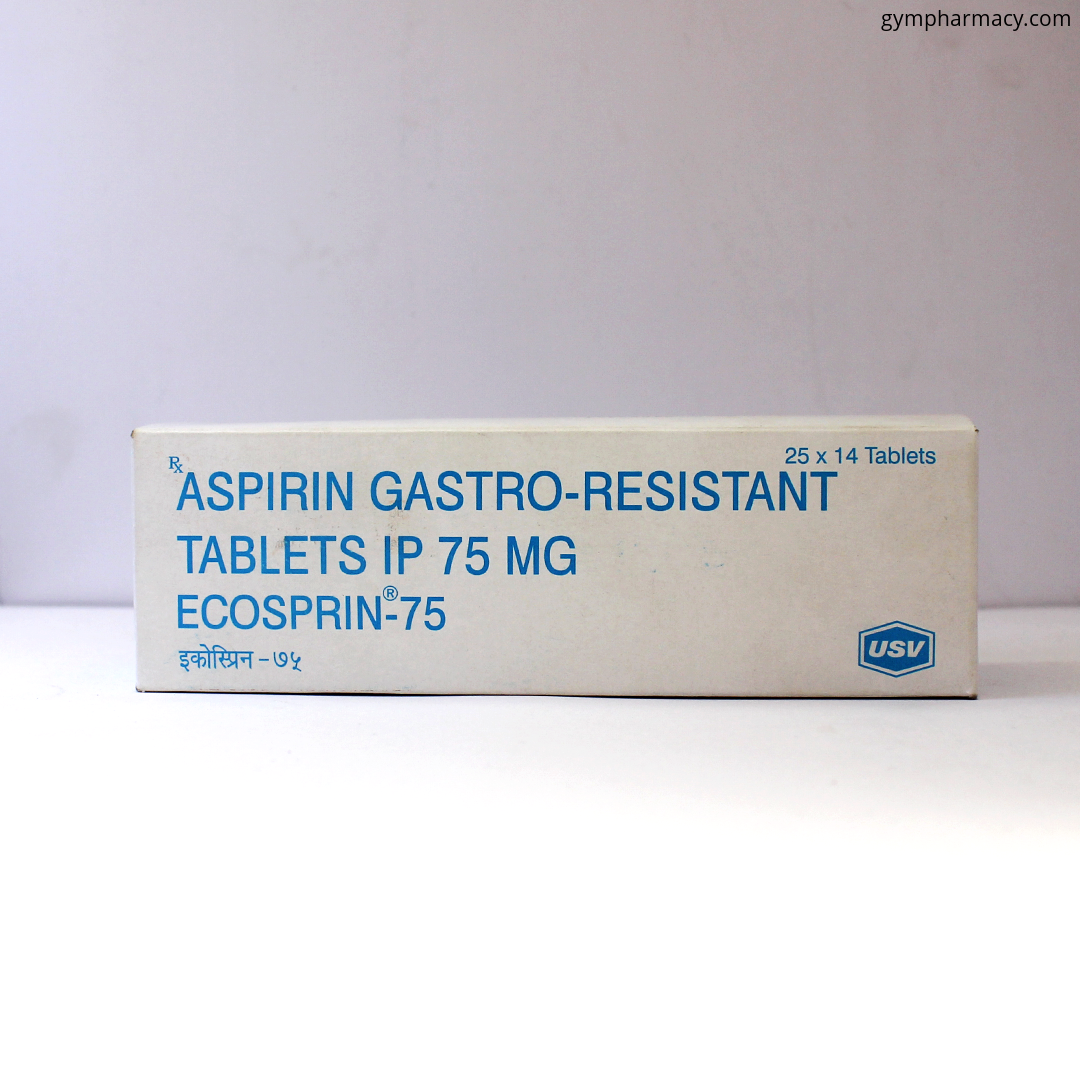


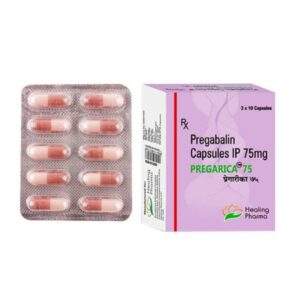
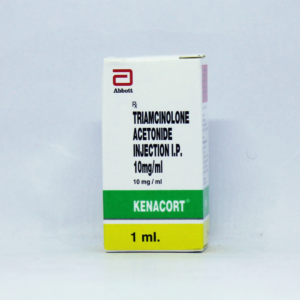
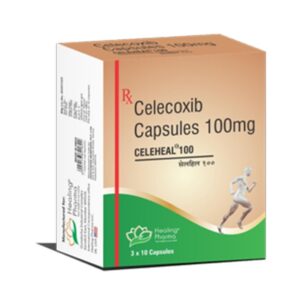
Leave a Reply
You must be logged in to post a comment.